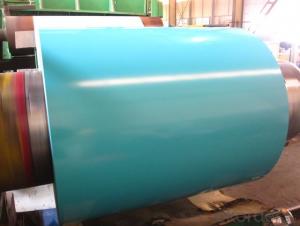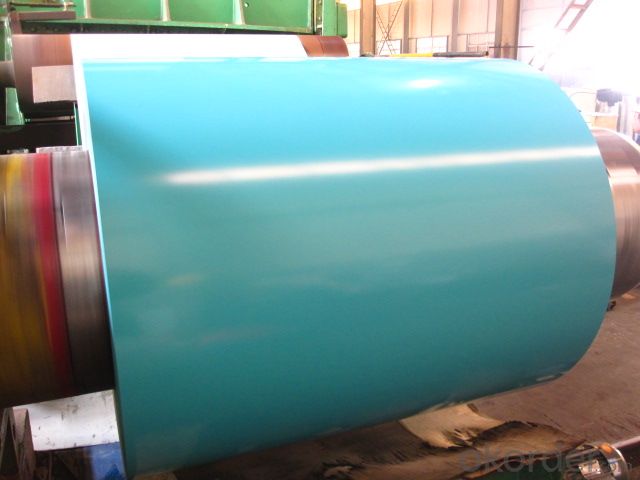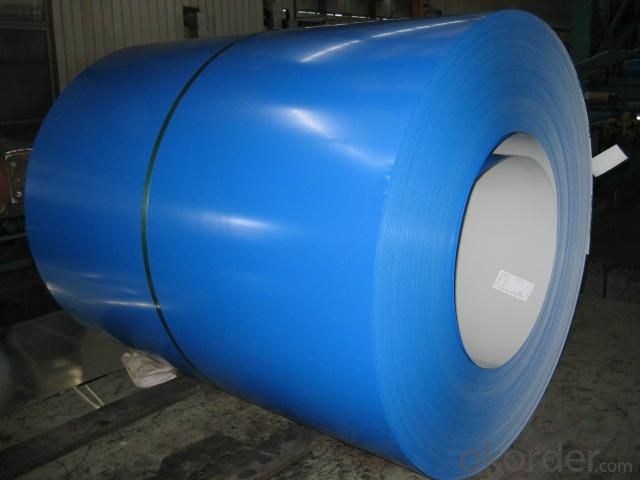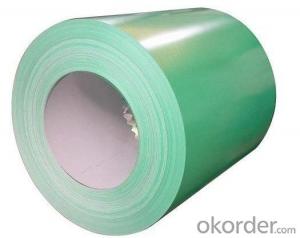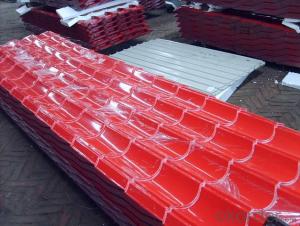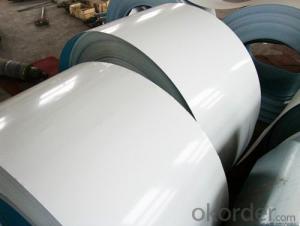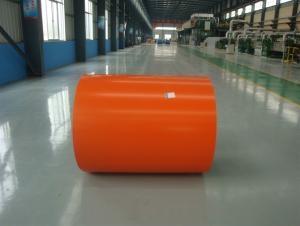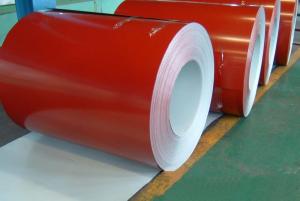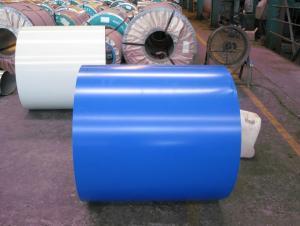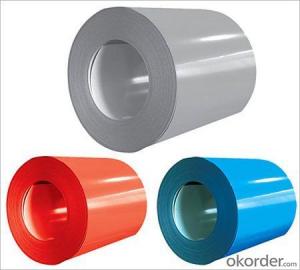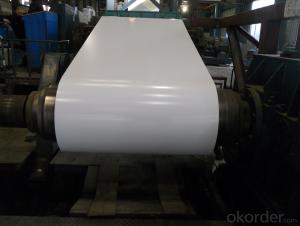PRE-PAINTED ALUZINC STEEL COIL WITH HIGH QUALITY
- Loading Port:
- Shanghai
- Payment Terms:
- TT OR LC
- Min Order Qty:
- 50 m.t.
- Supply Capability:
- 5000 m.t./month
OKorder Service Pledge
OKorder Financial Service
You Might Also Like
Painting steel is the product based on the metal sheet, of which surface is finally installed of the plastic film(PVC, PE) IN addition to being firstly covered with the coating and printed ink in. The coated layer of painting steel plate consists of chemical and filming layer, primer coated layer, pattern printed layer and surface coated layer. The top and back coating shall generally be the weatherproof paint, as well can be the application of the paint with special capabilities such as stain-resistant, self cleaning capability, high thermal resistance, antistatic capability, sterilizing capability, finger-print prevention and etc.
With GI(aluzinc) as base metal, after pretreatement(degrease and chemical treatment)and liquid dope with several layers of color, then after firing and cooling, finally the plate steel is called pre-painted galvanized (aluzinc)steel. Pre-painted galvanized steel is good capable of decoration, molding, corrosion resistance. It generally displays superior workability, durability and weather resistance.
Available specification:
PAINTING STEEL | |
BASE MATERIAL | HDGI, ALUZINC,CR |
GRADE | SGCC, DX51D,ASTMA653,EN10142,S350GD |
THICKNESS | 0.17-1.0mm |
WIDTH | 600-1250mm |
ZINC COATING | 60-200g/㎡ |
PAINT | PE,PVDF,SMP,HDP |
COILED | 508mm |
COIL WEIGHT | 3-6mt |
We can supply customers' with different specifications of the highest quality and lowest price.
Sincerely welcome to contact us for the future details if any item interest you ,and we will make every effort to assure that your requirements will be satisfied ,and we hope to establish long-term business relations with you on the basis of the equality and mutual benefit.
We are waiting for your email.
- Q: Can steel coils be used in the production of aerospace components?
- Yes, steel coils can be used in the production of aerospace components. Steel coils are commonly used in the manufacturing of various aerospace components such as structural frames, fasteners, landing gear, and engine parts. The high strength, durability, and versatility of steel make it a suitable material for these critical components in the aerospace industry.
- Q: What is the best butcher's steel around $20? I'm looking for a good tool to straight out some kitchen knives. thanks
- get one made in germany if you can. you might want to invest in some stones. they have some great videos on youtube on how to sharpen knives.
- Q: How are steel coils used in the manufacturing of aerospace components?
- Steel coils are used in the manufacturing of aerospace components primarily for their strength, durability, and ability to withstand high temperatures. These coils are typically formed into various shapes and sizes to create structural parts like fuselage frames, landing gear components, and engine mounts. The steel coils provide the necessary strength and rigidity to ensure the structural integrity of these aircraft components, making them essential in the aerospace industry.
- Q: How are steel coils unloaded from a truck?
- Steel coils are typically unloaded from a truck using a combination of heavy-duty forklifts, cranes, and specialized equipment. The coils are carefully lifted and positioned onto the ground or a designated storage area, ensuring proper safety measures and precautions are followed to prevent any damage or accidents during the unloading process.
- Q: I don't know it is low alloy steel or high allow steel or medium carbon steel
- Yes,30CrNiMo8 is a high grade alloy steel. *These steels generally contain higher carbon concentration (0.25%). As they are hardenable their mechanical properties can be tailored to specific needs by suitable adjustment of the annealing temperature. Finished products can be hardened to have a high surface hardness in combination with a tough and ductile core. The mechanical properties increase with increasing carbon concentration. Cr and Ni add additional improvements in properties. The Mn grades are a little cheaper. V and Mo add improved temperature resistance. The grades Cxx are developed for less stringent quality requirements but are cheaper.
- Q: What are the applications of steel coils in the aerospace industry?
- The aerospace industry relies heavily on steel coils for various purposes. One important application is in the manufacturing of aircraft structures. Steel coils are commonly used to fabricate wing spars, fuselage frames, and landing gear, as they possess high strength and durability necessary to withstand heavy loads and extreme conditions. Another significant use of steel coils in the aerospace industry is in the production of engine components, specifically turbine blades. These blades experience high temperatures and rotational forces, making it crucial to utilize steel coils due to their excellent heat resistance and mechanical properties. This ensures the reliability and performance of aircraft engines. Steel coils also find utilization in the production of fasteners and connectors necessary for securely joining different parts of an aircraft. Bolts, nuts, and rivets made from steel coils are essential for maintaining the structural integrity and safety of the aircraft. These fasteners need to possess high tensile strength and corrosion resistance. Furthermore, steel coils are employed in the production of fuel tanks and hydraulic systems. The weldability and formability of steel allow for the efficient fabrication of these complex structures. Steel coils can be shaped into various sizes and configurations, providing flexibility in designing fuel tanks and hydraulic components that meet specific requirements. In conclusion, steel coils are indispensable in the aerospace industry. Their use in aircraft structures, engine components, fasteners, and fuel tanks highlights their versatility and reliability. The exceptional strength, durability, heat resistance, and formability of steel make it the preferred material for various aerospace applications, ultimately ensuring the safety and performance of aircraft.
- Q: What are the dimensions of steel coils used in the oil and gas industry?
- The dimensions of steel coils used in the oil and gas industry can vary depending on the specific application and requirements. However, there are some common dimensions that are frequently used. Steel coils used in the oil and gas industry typically have a width ranging from 600mm to 2000mm. The outer diameter of the coil can range from 800mm to 2200mm, while the inner diameter can range from 508mm to 610mm. The weight of the coil can vary as well, ranging from a few tons to several tens of tons. These dimensions are designed to meet the needs of various processes involved in the oil and gas industry, such as pipe manufacturing, storage tank fabrication, and offshore platform construction. It is important to note that these dimensions are not fixed and can be customized based on the specific requirements of each project.
- Q: I'm getting my nose pierced, meaning that i have to keep the piercing in for a prolonged time. i've always had reactions when wearing sterling silver or fake earrings (i dont know what types of metal they were) after wearing it overnight. Will I get a reaction on my nose piercing if the stud is surgical steel?
- Surgical Piercing
- Q: How are steel coils used in the production of shipping containers?
- Steel coils are used in the production of shipping containers as they serve as the primary material for constructing the container body. These coils are cut, shaped, and welded together to form the walls, roof, and floor of the container, providing strength, durability, and protection for the goods being transported.
- Q: I want to get one of these knives but I am having trouble deciding which is the best overall knife??ThanksSOG Trident tigerSOG Vulcan TantoSOG Bi-Polar (Serrated)Cold Steel ScimitarCold Steel Recon 1
- May be you'll find something amongst those. Again, CQC-7 is a tanto blade and you wont find much use for it for every day use. You can, if you try, but why bother. Also, they today use 154CM steel, pretty good, used to be the top stainless cutlery steel, but rather old now. Hardened to 59-61 HRC. It's not that hard in the end, but will hold considerably better edge than AUS8 steel knives. One thing about CQC-7 it's using liner lock, which is not as strong or convenient as benchmade Axis Lock. Another thing to consider about CQC-7 is it's chisel grind, or single bevel. One side of the blade is flat, the edge is ground only on the opposite side. While this is easier to sharpen, one side vs. 2 sides on conventional blades, it has disadvantages in terms of normal cutting. Takes time to get used to it and you can't use it in certain grips to cut in different direction etc...
Send your message to us
PRE-PAINTED ALUZINC STEEL COIL WITH HIGH QUALITY
- Loading Port:
- Shanghai
- Payment Terms:
- TT OR LC
- Min Order Qty:
- 50 m.t.
- Supply Capability:
- 5000 m.t./month
OKorder Service Pledge
OKorder Financial Service
Similar products
Hot products
Hot Searches
Related keywords
